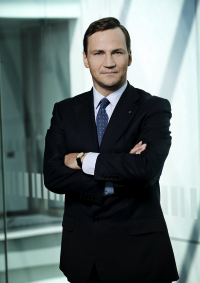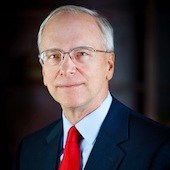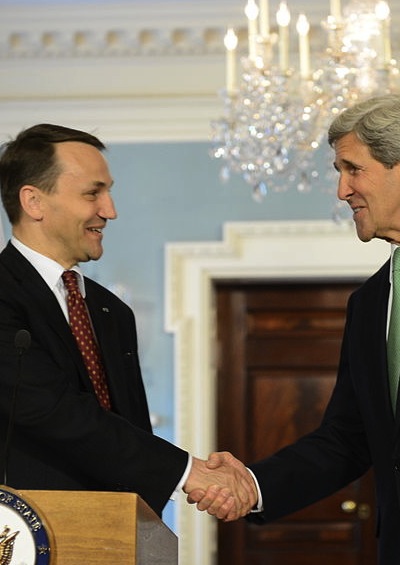Radek Sikorski: Truthteller in Action
A bold voice for a new direction in European foreign policy.
May 11, 2014

Radek Sikorksi, the Polish Foreign Minister seeking the European Union’s top foreign affairs post, is not at all afraid to take on big elephants. In 2011, for example, in an address in Berlin – the capital city of Poland’s mighty and often troubling neighbor — he famously stated:
I demand of Germany that, for your sake and for ours, you help [the eurozone] survive and prosper…I will probably be the first Polish foreign minister in history to say so, but here it is: I fear German power less than I am beginning to fear German inactivity.
Then, in 2013 in a speech in London – the city where he had cut his teeth as a young student émigré and once befriended the current conservative leaders, during the times of Polish martial law in the early 1980s — he spoke truth to power once again. He addressed the increasingly Eurosceptic British on the many ways that they benefit from membership in the EU, chiding them that:
The EU is an English-speaking power. The Single Market was a British idea. A British commissioner runs our diplomatic service. You could, if only you wished, lead Europe’s defence policy. But if you refuse, please don’t expect us to help you wreck or paralyze the EU.
Then, in February 2014, Sikorski was on the ground in Kiev – along with the foreign ministers of Germany and France. They had flown in to stem the violence in the streets and to negotiate an interim power-sharing agreement among all parties, aiming to end the blood-soaked crisis.
Richter & Wise
– Radek Sikorski: Europe’s Next Top Diplomat?
– Radek Sikorski: Truthteller in Action
Like anyone vocal in the public sphere, Sikorski is not without his critics. Warsaw’s Polityka magazine has compared his character to the frenetic nature of France’s former President Nicolas Sarkozy. Both men are said to have a “…hyperactive zeal in launching multiple initiatives which deliver only very modest results.”
The Ukraine question
Ukraine provides a case in point. The meeting of the EU’s European Partnership last fall in Vilnius was supposed to be a triumph for Sikorski and Sweden’s foreign minister Carl Bildt. Then, Ukraine’s Yanukovich – at Putin’s behest — pulled the rug out from under them by announcing that his government was not going to sign the EU Associate Agreement after all.
Then, the interim agreement hammered out in Kiev in the February uprising collapsed the very next day and was followed in rapid succession by the Russian show of force and annexation.
In the meantime, Sikorski has been working to pick up the pieces by midwifing the transitional government towards a Western bailout.
How all of this adds to Sikorski’s reputation, or detracts from it, depends in large measure on how the current tensions with the Kremlin play out.
Teddy-like
What is certain, however, is that Sikorski, recalling the famous words of Theodore Roosevelt at the Sorbonne, has been the archetypical “man in the arena… who at the best knows in the end the triumph of high achievement, and who at the worst, if he fails, at least fails while daring greatly.”
Rarely has an individual been seemingly as well qualified for the post for which they are being considered. In his seven years as a seasoned foreign minister, Radek Sikorski has been an unabashed champion of both the idea of Europe and of the Eurozone – at a time when both are under attack.
The “kingmaker”
In the end, whether Sikorski replaces Ashton in Brussels depends on two things: First, whether the EU’s decision makers want him in that role. Second, the selection of the presidents of the European Commission and European Council plus Foreign Affairs is a three-way package deal that requires geographic, political and gender balance.
But German Chancellor Angela Merkel is reportedly in favor of Sikorski for this role – which is no small endorsement.
The Russia question
In addition, there is the matter of his generally neoconservative worldview and his – at least past — aggressiveness towards Russia. With Russian tanks menacing Ukraine, these positions will win him both supporters and opponents to his candidacy.
It should be noted, however, that Sikorski, whether in pursuit of higher European office or as a matter of true wisdom and insight, has recently shown remarkable restraint when it comes to pushing (Polish) shale gas – or going after the Russians whole hog.
That is a noticeable difference to his earlier career, when he served in the Kaszynski government as defense minister.
Also on the positive side of the scale is the fact that Sikorski is liked and trusted by the newer EU states. Moreover, the consensus view is that the time has come from the newer states to have one of the top EU posts.
No one else who fits that description has stepped up. His time may have come at last.
Takeaways
German Chancellor Merkel reportedly favors Sikorski as Europe’s new foreign policy boss – a big endorsement.
Sikorski has been compared to the frenetic nature of France’s former President Nicolas Sarkozy.
Radek Sikorksi is not at all afraid to take on big elephants, from Germany to Britain to Russia.
Authors

Stephan Richter
Publisher and “Editor-in-Chief of The Globalist, and Director of the Global Ideas Center, a global network of authors and analysts.

David W. Wise
David W. Wise is a former business executive with over thirty years of experience. He recently retired to work on a book on diplomatic history.
Read previous

Radek Sikorski: Europe’s Next Top Diplomat?
May 11, 2014